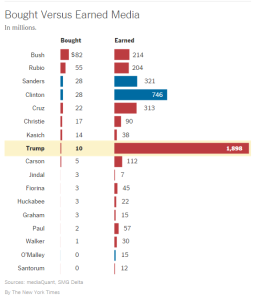Putting a dollar value on “free” or “earned” media can help put in perspective the supposedly tsunami-like sums of money spent by candidates and independent super PACs on the campaign trail. The New York Times recently did just that, and found that the value of media coverage exceeds candidate and super PAC spending on paid advertising for every major current (or former) presidential candidate in the 2016 race:

Columnist A. Barton Hinkle observed this irony – or hypocrisy – in a December column, writing, “There is no functional difference between [an] advertisement and an editorial or op/ed column. There is no financial difference, either: Both cost a lot of money to distribute.” And as the Times discovered, the amount media spends doing this is far from trivial; in fact, it exceeds the much-hyped “Big Money” spent on advertising by super PACs and the candidates themselves.
Those who want to “overturn” Citizens United and limit the size of contributions to independent entities like super PACs make no similar effort (thankfully) to regulate the political speech of media corporations, instead arguing that the press plays a unique role of government watchdog that entitles it to rights beyond those afforded to other incorporated entities. This corporate political speech, they argue, is the “good” corporate political speech.
Oh really. Consider the most eye-popping feature of that Times chart: Donald Trump’s incredible advantage over every other candidate in “earned” media. Trump has received nearly $2 billion – that’s billion with a B – in free media coverage, “about twice the all-in price of the most expensive presidential campaigns in history.” As the Times story notes, the amount of earned media Trump enjoyed just last month alone was “about what John McCain spent on his entire 2008 presidential campaign.”
You’d have to be crazy to call such a disparity a product of civic duty. The media loves covering Trump’s campaign because he draws higher ratings than any other candidate, and higher ratings allow networks to make more money from advertising. It’s more Gordon Gekko than Alexis de Tocqueville.
But you don’t have to take it from me. Just ask CBS Chairman Les Moonves, who recently opined on Trump’s rise to prominence, quipping “It may not be good for America, but it’s damn good for CBS.”
That about sums up the media’s self-interested coverage.
Idealistic conceptions of the role of the press – or of political parties, for that matter – skew our expectations about how speech should play out in the real world. That leads to an environment where more scrutiny is applied to speakers than to government restrictions on political speech. We argue over whether super PACs are good or bad when the important question is whether the regulations prohibiting their existence were constitutional.
A full assessment of money in politics finds little black and white, and a whole lot of grey. The media are not angels, and super PACs are not demons. They are both speakers exercising First Amendment rights.
Americans may not like media corporations, but they would certainly abhor efforts by the government to restrict their ability to speak frankly about politicians. Maybe they will one day feel the same about super PACs and all manner of government regulations stifling political speech. There’s no reason they shouldn’t.












